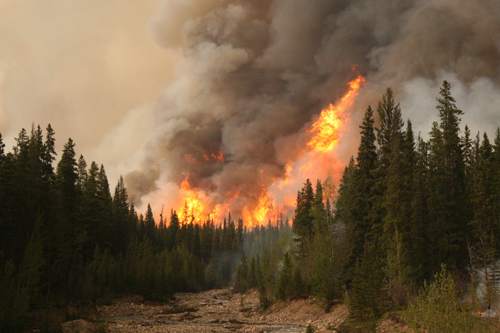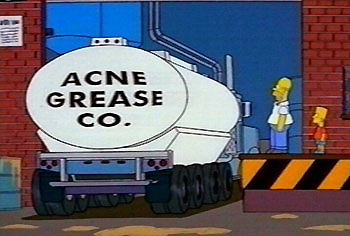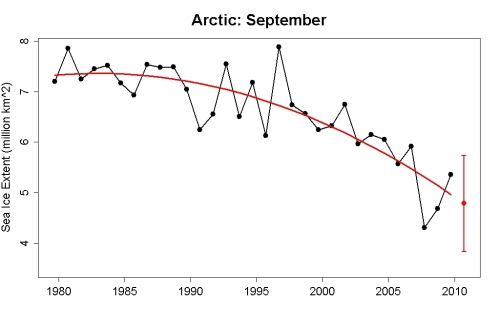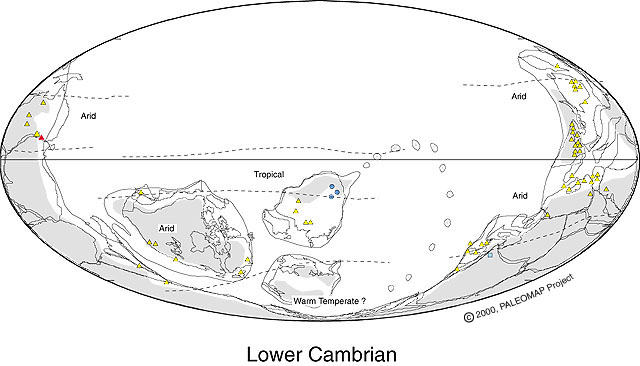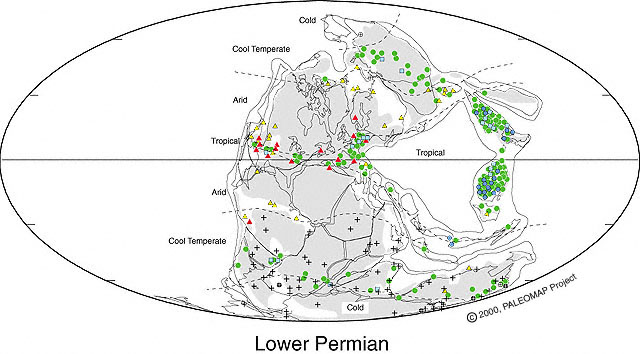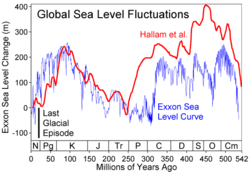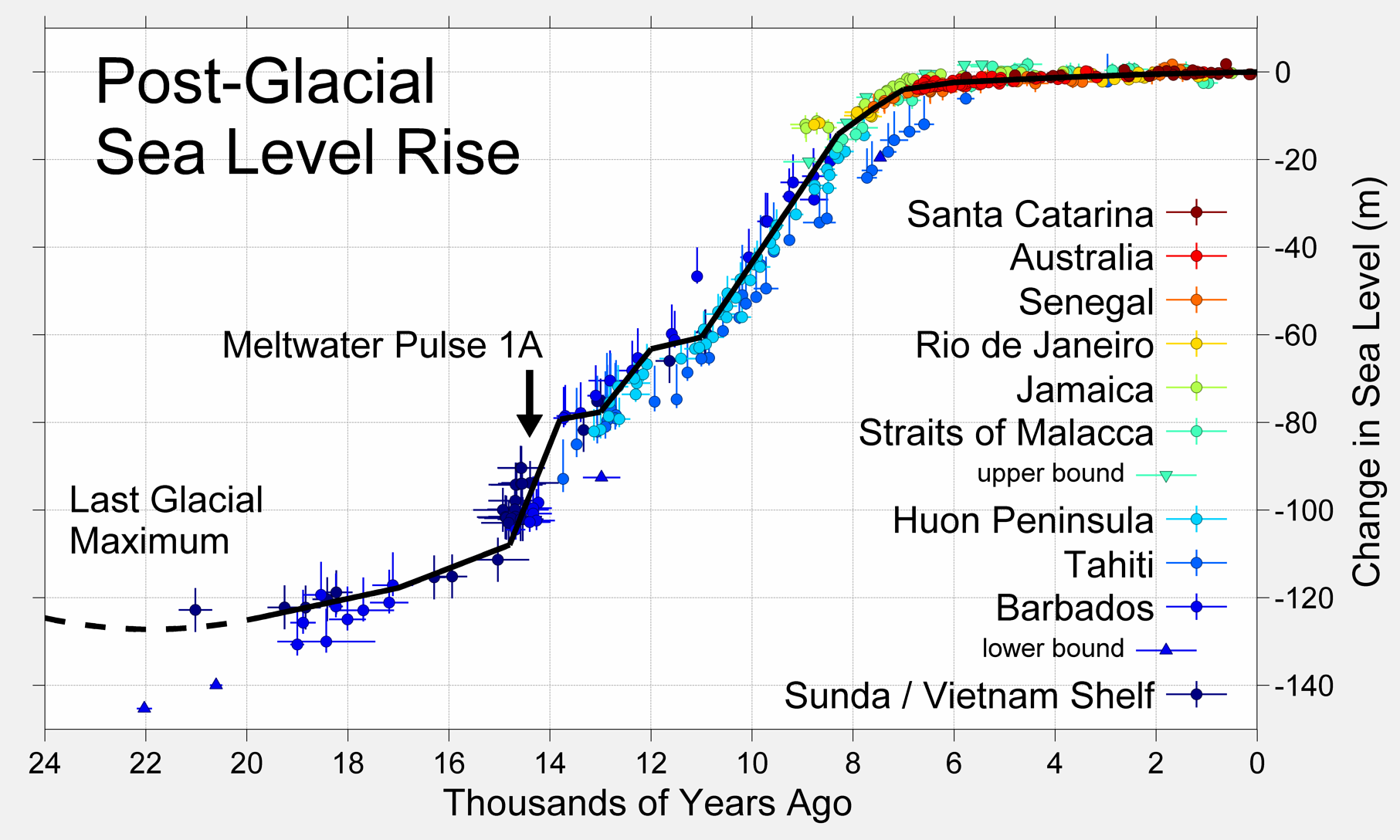In recent years, the climate wars have witnessed the rise of a group of self-identified "lukewarmers," people who, to borrow Greg Easterbrook's self-description, believe that:
[G]lobal warming is scientifically confirmed but exaggerated as a threat; that greenhouse gas regulation is justified, but not an emergency need.
The first use of the term I have found was by David Smith, on "Watts Up With That" (a bit of foreshadowing, that):
I am a “lukewarmer” who thinks that the world is warmer than it would otherwise be due to anthropogenic gases (but doubts that the impact will be extreme).
Probably the most famous "lukewarmer" is Lucia Liljegren, a mechanical engineer (surprise!) whose blog, The Blackboard, can be found on the blogroll here. The Blackboard entertains many lukewarmers, along with a bunch of deniers and a smattering of pro-consensus folks, including myself.
Another self-described lukewarmer, Steven Fuller, has stepped into the giant floppy red shoes of Steven Goddard at WUWT, now that Steve has metastasized to his own blog. His self-description is the closest to providing a clear, testable proposition, as well as reflecting, by my reading, the central thrust of the comments by the "lukewarmers" on The Blackboard:
It’s because I am a ‘lukewarmer,’ one who believes that the physics of climate change are not by theselves controversial, but who believes that the sensitivity of the earth’s atmosphere to a doubling of concentrations of CO2 is not yet known, but is likely to be lower than activists have claimed.
Before I get into what the climate sensitivity might be, it's important to note who the lukewarmers are, which is slightly different from their self-definition. The lukewarmers to a person are critical of the IPCC, but when we take a look at the estimates of climate sensitivity cited by the IPCC, it's clear that thinking climate sensitivity is low is not enough to get on the outs with them:

Most estimates of climate sensitivity, regardless of how they are derived (and there are several lines of evidence including comparisons with paleoclimate, response to modern forcings like the Mount Pinatubo eruption, and climate modeling) include in their 95% confidence interval sensitivities between 1-2C. In some cases, the central estimate is between 1.2-1.5C for a doubling of CO2. So favoring a low number for climate sensitivity is not, by itself, enough to put you at odds with the "consensus." You need the other piece – the it's-not-a-big-deal piece. And that's where the trouble starts.
There is a half-full glass here, which is that a number of people who clearly identify emotionally and politically with the denialist movement have taken major steps towards the scientific consensus in order to maintain their credibility. While sharing the denialosphere's loathing of "activists" and its demonization of scientists like Hansen and Mann (whose unforgivable sin was to establish beyond a reasoned doubt that humans are causing a rapid and substantially unprecedented warming of the earth's climate) the lukewarmers avoid three major pitfalls of denialism:
1. They do not have to deny the basic physical laws which dictate that greenhouse gases cause warming.
2. They do not have to refute the massive physical evidence that the climate is warming.
3. They do not have to pretend that the vast majority of scientists who accept the theory of AGW are participating in a vast conspiracy to hide the truth about (1) and (2).
The lukewarmist position also allows one to position oneself as a moderate threading the needle between two extremes. Steven Fuller again:
The operation of CO2 as a greenhouse gas is one of the least controversial ideas in physics. The calculations that show a temperature rise of between 1 and 2 degrees Celsius if concentrations double is also widely accepted, including by all skeptic scientists without (AFAIK) exception.
We don’t know the sensitivity of the atmosphere to a doubling of CO2, so the effects of feedbacks are not know. Activists think it is 3 degrees or higher. Contrarians think it is very low–1, maybe 2, tops, some thinking it is even lower.
If activists are right we have a very big problem on our hands. If contrarians are right we don’t. If both are wrong, there is a lukewarmer’s way.
Note that the best science around puts climate sensitivity between 2.6-4.1C. It's not "activists" who put climate sensitivity at around 3C or higher – except as far as the activists are saying: Hey, those scientists that have spent their lives in this field probably are the best source of information regarding climate sensitivity.
The real contrast here is not between "activists" and "skeptics" but between deniers and everybody else – between the science and the right-wing lunacy. But lukewarmers are exploiting the shift in
the Overton window brought about by voluble climate deniers to position their radical views as a sane middle ground.
Here's the problem. Lukewarmism doesn't get its adherents where they want to go – because even if we accept at face value their claims, the world would still require intense efforts to reduce the emissions of greenhouse gases in order to stave off disaster.
Scientists estimate a warming of 2C as the upper limit of what our civilization can adapt to, and not suffer disaster on a planetary scale. This is probably
an optimistic number:
… even a “moderate” warming of 2°C stands a strong chance of provoking drought and storm responses that could challenge civilized society, leading potentially to the conflict and suffering that go with failed states and mass migrations. Global warming of 2°C would leave the Earth warmer than it has been in millions of years, a disruption of climate conditions that have been stable for longer than the history of human agriculture. Given the drought that already afflicts Australia, the crumbling of the sea ice in the Arctic, and the increasing storm damage after only 0.8°C of warming so far, a target of 2°C seems almost cavalier.
The hard lower limit of climate sensitivity -- the lowest it can possibly be and account for our direct observations – is about 1.1C (the real number is very likely to be in that range of 2.6C-4.1C – but we are following the "lukewarmist" argument to see where it leads). The change in forcings expected from a "business as usual" 21st century are +8.5W/m^2 – about 2 1/3 doublings of CO2.
Hence with the lowball number – the number Steven Fuller attributes not to lukewarmers but to out-and-out deniers – put us on course for 2.5C of warming this century. In other words, the lukewarmers' own numbers belie their causal attitude to reducing greenhouse emissions.
Now the deniers – sorry, excuse me, the "lukewarmers" – may say the projected emissions are much too high; that the IPCC is way off with those numbers as well. Or they could take the bull by the horns and claim, despite all the evidence to the contrary, that warm can tolerate warming of 3C or 4C without any major problems (the last time the world was that hot was several million years ago; there were no ice caps to speak of and the sea level was hundreds of feet higher). The trouble with that position is that it undermines the whole thrust of lukewarmism – which is to acquire credibility (or, to be fair, possibly to exercise intellectual honesty) via the advantages (1), (2), and (3).
Disputing one point with the scientific community – climate sensitivity – is compatible with a reasonable, pro-science argument. Hey, it happens -- an idea becomes the established consensus, and it turns out to be, not completely wrong maybe, but off (this has already happened several times in climate science -- unfortunately, every time, to date, the majority of the mistakes have been in the direction of under-estimating the speed and magnitude of the effects of global warming.)
However, when you begin to argue that not only does science have climate sensitivity wrong but also emissions and maybe impacts to boot – well, you're going to have a hard time explaining why thousands of scientists have made not one but a series of mistakes, all supposedly exaggerating the dangers of global warming. Go down that road, and pretty soon you're right back in the tinfoil-hat camp lukewarmist rhetoric was supposed to deliver you from. If you allege not one but a whole series of gigantic mistakes by huge numbers of investigators, all tending to undermine a scientific conclusion (only rapid reductions in emissions of greenhouse gases can prevent a substantial risk of planetary disaster) to which you are avowedly hostile, the simplest conclusion is not that you are a genius and the rest of the scientific community are fools; it is that you are a partisan and you are attacking science with implications contrary to your political goals.
In Part 2, I'm going to give the "lukewarmers" even more rope, and show how even widely unrealistic lowballing of climate change fails to make a rational case for business as usual.
